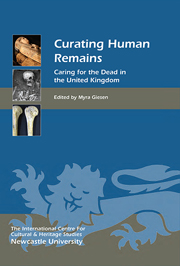Book contents
- Frontmatter
- Contents
- List of Illustrations
- Acknowledgments
- List of abbreviations
- Introduction: Human Remains Curation in the United Kingdom
- 1 International Perspectives towards Human Remains Curation
- 2 Dealings with the Dead: A Personal Consideration of the Ongoing Human Remains Debate
- 3 Care, Custody and Display of Human Remains: Legal and Ethical Obligations
- 4 The Impact and Effectiveness of the Human Tissue Act 2004 and the Guidance for the Care of Human Remains in Museums in England
- 5 Dead and Forgotten? Some Observations on Human Remains Documentation in the UK
- 6 Tethering Time and Tide? Human Remains Guidance and Legislation for Scottish Museums
- 7 The Quick and the Deid: A Scottish Perspective on Caring for Human Remains at the Perth Museum and Art Gallery
- 8 The Museum of London: An Overview of Policies and Practice
- 9 Curating Human Remains in a Regional Museum: Policy and Practice at the Great North Museum: Hancock
- 10 Curation of Human Remains at St Peter's Church, Barton-upon-Humber, England
- 11 Archaeological Human Remains and Laboratories: Attaining Acceptable Standards for Curating Skeletal Remains for Teaching and Research
- 12 ‘No Room at the Inn’ … Contract Archaeology and the Storage of Human Remains
- 13 Changes in Policy for Excavating Human Remains in England and Wales
- 14 Conclusions and Ways Forward
- Appendix 1 DCMS Guidance for the Care of Human Remains in Museums: Contents page and Part 2
- Appendix 2 MGS Guidelines for the Care of Human Remains in Scottish Museum Collections: Contents page and Chapter 2
- List of Contributors
- Index
- Miscellaneous Endmatter
3 - Care, Custody and Display of Human Remains: Legal and Ethical Obligations
Published online by Cambridge University Press: 05 May 2013
- Frontmatter
- Contents
- List of Illustrations
- Acknowledgments
- List of abbreviations
- Introduction: Human Remains Curation in the United Kingdom
- 1 International Perspectives towards Human Remains Curation
- 2 Dealings with the Dead: A Personal Consideration of the Ongoing Human Remains Debate
- 3 Care, Custody and Display of Human Remains: Legal and Ethical Obligations
- 4 The Impact and Effectiveness of the Human Tissue Act 2004 and the Guidance for the Care of Human Remains in Museums in England
- 5 Dead and Forgotten? Some Observations on Human Remains Documentation in the UK
- 6 Tethering Time and Tide? Human Remains Guidance and Legislation for Scottish Museums
- 7 The Quick and the Deid: A Scottish Perspective on Caring for Human Remains at the Perth Museum and Art Gallery
- 8 The Museum of London: An Overview of Policies and Practice
- 9 Curating Human Remains in a Regional Museum: Policy and Practice at the Great North Museum: Hancock
- 10 Curation of Human Remains at St Peter's Church, Barton-upon-Humber, England
- 11 Archaeological Human Remains and Laboratories: Attaining Acceptable Standards for Curating Skeletal Remains for Teaching and Research
- 12 ‘No Room at the Inn’ … Contract Archaeology and the Storage of Human Remains
- 13 Changes in Policy for Excavating Human Remains in England and Wales
- 14 Conclusions and Ways Forward
- Appendix 1 DCMS Guidance for the Care of Human Remains in Museums: Contents page and Part 2
- Appendix 2 MGS Guidelines for the Care of Human Remains in Scottish Museum Collections: Contents page and Chapter 2
- List of Contributors
- Index
- Miscellaneous Endmatter
Summary
Introduction
Various types of repositories have custody of, and care for, human remains, ranging from university collections or medical institutions to local or national museums (see Introduction). Therefore, the general term ‘holding repository’ will be used in this chapter to refer to the institutions that store, care for, use in research or occasionally display human remains. Similarly, the types of human remains held by holding repositories vary in nature from small bone fragments and tissue samples to complete skeletons. There is an increased sensitivity regarding the recently dead, particularly for their relatives. However, other remains may be of people who died many years ago, some of whom are identified by name whilst many remain unknown. Since the 2004 reforms the legal regime governing human remains of people who died less than 100 years ago is much more stringent than for older remains. The focus of this chapter is on the legal and ethical position in England regarding the custody, care, use and display of human remains by holding repositories.
After discussing the meaning of ‘custody’ and ‘care’ in legal and ethical terms within this context, the discussion will turn to the particular legal and ethical obligations under which holding repositories operate. Legal obligations under English law are derived from statutes and the common law (which is based on decided legal cases) and are binding on these repositories since non-compliance will result in legal sanction.
- Type
- Chapter
- Information
- Curating Human RemainsCaring for the Dead in the United Kingdom, pp. 31 - 42Publisher: Boydell & BrewerPrint publication year: 2013



